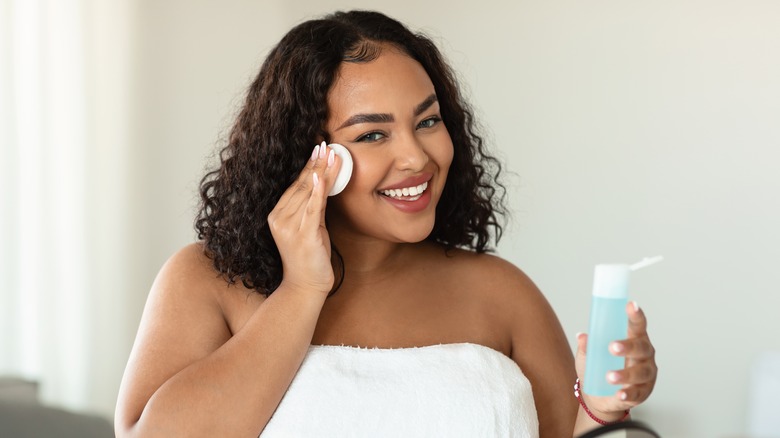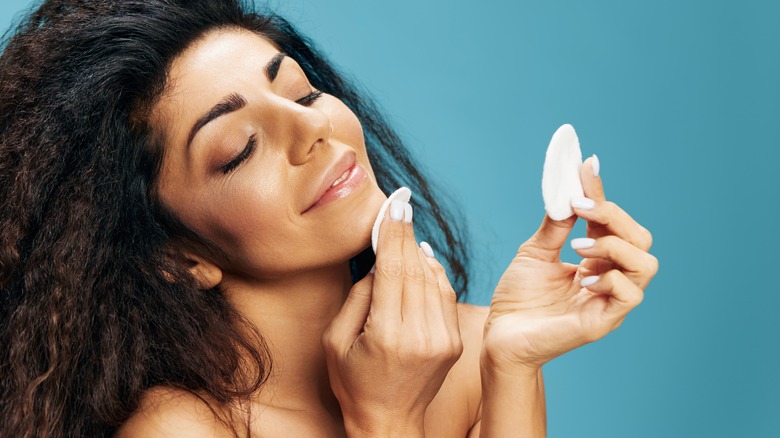It's Time To Stop Using Witch Hazel As A Toner - Here's Why (And What To Use Instead)
If you pick up a bottle of toner and turn it around, you'll most likely find witch hazel high on the list of ingredients. The songs of witch hazel's gifts have been sung far and wide for a while now. It's supposed to help with everything from acne to insect bites, but can one ingredient really pack in all these benefits? The witch hazel we commonly see in skincare is a natural extract derived from the leaves, bark, and twigs of the plant. This humble botanical extract has been widely used for its medicinal properties for centuries.
But, in recent years, witch hazel has migrated over from its pharmaceutical uses to a prime skincare ingredient in toners, thanks to its natural astringent and anti-inflammatory properties. To know why you should stop using toners with witch hazel in them, you first need to understand the role your toner plays in your overall skincare routine. As board-certified dermatologist Debra Jaliman explained to Byrdie, a toner serves two important purposes. First, it cleanses your skin of any impurities it picks up during the day.
Toner also gets rid of excess oil, dirt, and pore-clogging makeup residue to keep your skin looking clear and healthy. Daphne Studio's Gunna Covert added: "[Toners] exfoliate, help balance the pH level of the skin, and even help other skincare products penetrate deeper into the skin." So, why do you need to steer clear of witch hazel, when it's one of the most common ingredients found in toners?
Why a witch hazel toner might not be the best option for you
When board-certified dermatologist Dr. Hadley Green, MD, spoke to Mind Body Green, she extolled the benefits of including witch hazel in toner, noting that it's "a natural astringent, so it is often used to remove excess sebum and temporarily decrease the appearance of pores." Dr. Rachel Nazarian, another board-certified dermatologist, even gushed to Harper's Bazaar that witch hazel can perform a toner's cleansing function because of the naturally occurring tannins, which also act as an anti-inflammatory, "So it's a toner that more deeply cleanses [the] skin by removing surface oils and bacteria, but also a calming active ingredient."
While this all sounds very promising, it's important to proceed with caution when dealing with witch hazel because it can have a high alcohol concentration. The reason for this lies in the processing of the plant. Witch hazel is most commonly extracted or distilled using alcohol to create an astringent toner. Harsh ingredients like this aren't conducive to your perfect skin journey.
As board-certified dermatologist Dr. Deborah Longwill, DO, informed Prevention, "If the alcohol content is too high for your skin, it will dry out or cause disruption to the skin's barrier function." Since toning is likely already a key part of your skincare routine, you could be regularly exposing your skin to excessive alcohol and even causing serious damage since the tannins can dry it out and create deeply-rooted irritation.
Look for these alternative key ingredients in a toner instead
Similar to most skincare products, the best toner for you varies depending on your skin type. You should also be mindful of any existing problems to ensure the toner doesn't exacerbate them. If you have dry skin, for instance, opt for an alcohol-free toner with nourishing ingredients to regain any lost hydration. While speaking to Byrdie, Dr. Corey Hartman, MD, a board-certified dermatologist, suggested, "Seek[ing] toners with glycerin, hyaluronic acid, rosewater, or aloe" since "These ingredients add moisture to the skin while balancing [the] skin's tone."
For sensitive skin, choose toners with minimally-invasive, gentle, and soothing ingredients like chamomile and aloe vera, as Michele Green, MD, a board-certified cosmetic dermatologist, recommended to Insider. If you have oily skin, look for ingredients that keep your pores clear and reduce sebum production such as niacinamide, hyaluronic acid, alpha hydroxy acids (AHAs), and salicylic acid. Either way, you should always be wary of certain claims that can cause harm to your skin.
"Any toners that advertise ingredients like high concentrations of alcohol or witch hazel or over-glorify astringent and exfoliating properties should be avoided," as board-certified dermatologist Zain Husain, MD, warned Prevention. He also strongly advised against toners with heavy synthetic fragrances because they can irritate your skin. And, as with every beauty product, you should do a patch test with a new toner to determine its compatibility with your skin before use.


